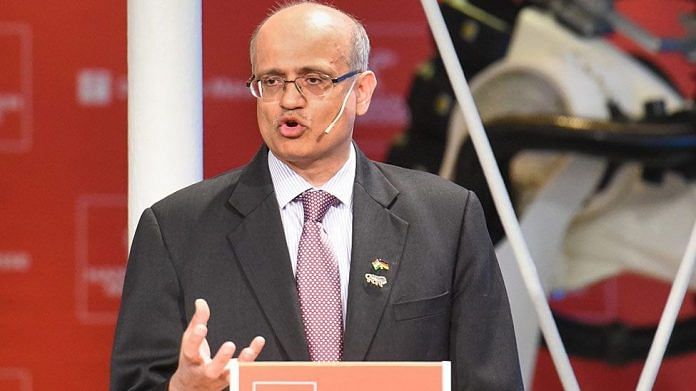New Delhi: India and China must resolve the gap in “identity perceptions” as it leads to mistrust, distrust and misperception, said former foreign secretary Vijay Gokhale at a virtual event Thursday.
Speaking on his latest paper on Sino-India ties, published Wednesday, Gokhale expanded on the gap ‘identity perceptions’ and said that Beijing has not placed India as an important country, exhibiting a certain “deafness” towards India’s foreign policy ambitions and sensitivities.
At the virtual event ‘India-China: The Road from Galwan’ that was hosted by Carnegie India, he noted that the identity perception is perhaps to a greater extent on the Chinese side as it did not place India in a position, within its foreign policy, where it could have been able to anticipate its reactions.
“They [China] were perhaps caught by surprise by subsequent Indian reactions,” he said, referring to the events that took place along the India-China border last year.
The former foreign secretary also observed that the gap in identity perceptions leads to “attaching motives to every action that each party takes”.
In his paper as well, Gokhale argued that misperceptions and mistrust between the two countries occurred across three phases beginning with the 2008 financial crisis.
In the event, he explained that after the global crash, China reoriented its foreign policy along the lines of major power relations. “It [China] had already perhaps decided to create a new framework in which it felt that if it was not equal to the United States, it was at least the number two power. And that Russia had slipped to number three.”
“They [China] chose not to give a proper position to India and therefore there was no assumption that India might respond in any particular way to their policies,” he added.
However, in the making of Indian foreign policy, China had been given a place of importance, be it admiration for its economic success or otherwise, said Gokhale.
He also pointed out that India needed to better understand that Chinese President Xi Jinping’s policies, such as the Belt and Road Initiative (BRI), were part of a “global policy” and not an “India-specific policy”.
“But it’s a little difficult to believe that making the China-Pakistan Economic Corridor as a flagship project a month before President Xi received PM Modi in Xi’an, would not in their own minds alert them to the fact that India would react in some way,” said Gokhale at the event.
Also read: Why China is the Kautilya of international politics
‘India-US 123 Agreement was a turning point in Sino-India ties’
Gokhale explained that 2008 was a “turning point” as it was the year India inked the 123 Agreement with the US.
On 11 October 2008, then external affairs minister Pranab Mukherjee and US secretary of state Condoleezza Rice made the final seal on the 123 agreement, which paved the way for civil nuclear cooperation between the two countries.
At the time, China had assumed that non-proliferation of nuclear weapons was “so dear” to the US, that there would be no meeting point on a nuclear deal given there were so many differences between Washington and New Delhi, explained Gokhale.
“This sort of argument fell apart. And consequently, from that point on, their [China’s] anxiety increased,” he said.
Gokhale explained that by not recognising India as an important country in its own right and one that was always “adjunct” to another country, Beijing perceived India as “veering” towards US and “that the obvious reason must be the containment of China”.
He added that India’s subsequent behaviour of viewing every Chinese policy with suspicion also fed into China’s narrative.
Gokhale remarked that a reset in the India-China relationship is no longer possible but rather, it has to be rebuilt at the top-level by PM Modi and President Xi.
(Edited by Rachel John)
Also read: Don’t rush to give clean chit to China. Mumbai power grid failure is a strong warning




I think – with profound respect – it goes far beyond perceptions. Nor are the differences amenable to being sorted out by the two paramount leaders meeting and striking a friendly chord. Once read that President Xi likes his summit meetings to be formulaic, with all the hammering out of contentious issues having taken place lower down the hierarchy. No grand gestures, signed off on the spur of the moment. 2. Thoughts sometimes go to the 1960 visit of Premier Chou en lai. He had brought a peace proposal, which we cannot hope to improve upon even today. Rebuffed. The rest is history, although no one could have foreseen China’s stunning rise, starting twenty years later. 3. Whatever decisions are taken on the future of this relationship should be marked by exceptional foresight, for they will outlast the tenure of the government of the day. If push comes to a terrible shove, they should stand on their own merits, One on one.